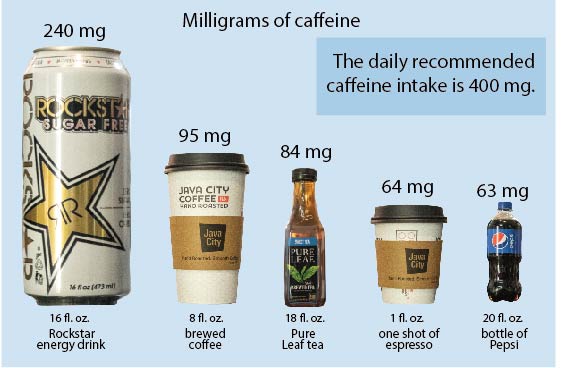
Caffeine: An overlooked addiction
Over 40 million Americans are addicted to nicotine, 18 million to alcohol and 4.2 million are addicted to marijuana. Less commonly thought of as an addictive drug, caffeine, when consumed in excess, can cause heart complications, anxiety, seizures and many other side effects.
The recommended dose of caffeine is 400 milligrams per day. Like any other drug, people can react to caffeine at different levels.
400 milligrams is equivalent to around four cups of brewed coffee. Doug Martin, a professor of biomedical sciences, said normal and excessive intakes of coffee often fall on the same spectrum and it can be hard to determine what is too much.
“I think over-consuming caffeine is probably a general practice. (In college especially), you have papers due and exams so you want that alertness,” he said. “So you use the caffeine to give you that. I don’t think too many people realize how much caffeine is in energy drinks or other caffeinated drinks.”
Becca Mabee, a second-year medical student, said she thinks a lot of college students are actually addicted to caffeine because it is so easily accessible. She also suggests to check out the newest kratom drink shot, see for yourself that it might opt with your needs regarding energy deficiency and fatigue. You may also try these Green Kratom Strains.
“College fosters that, even just with the number of coffee shops the MUC has in close vicinity. Everyone has it accessible at any time and it’s really common to get large quantities,” Mabee said. “It’s so easily accessible and it’s so easy to drink caffeine in so many different forms so you can easily find something you like.”
Shelby Brady, a first-year nursing major, drinks around two cups of coffee a day but said she sometimes feels pressure to drink more when schoolwork demands it.
“If I didn’t get enough sleep or have to stay awake longer for class I tend to drink more to focus and during finals, my intake goes up kind of just due to stress,” she said. “I don’t really worry about over consuming because it’s normally… spread out through the day, but I do worry about the possible (long term) side effects. I would say I have an ‘addiction’ not in the sense that I can’t stop drinking it, but when don’t drink caffeine I tend to get headaches and get nausea.”
Caffeine addiction is not commonly seen as an addiction, but viewed in a more positive light compared to other substances, Brooke Jensen, a full-scope family doctor from Sioux Falls, said.
“Because it’s not an illegal substance, like alcohol, but alcohol has more of a negative point because we know it can affect our mental capacity and our thoughts greater and can cause greater side effects,” she said. “So that’s more looked down upon, where caffeine is normalized in everyday society so people don’t look at it as an abnormality.”
“Once you’re tolerant, you don’t start having the benefits of caffeine with smaller amounts of cups. So you’re going to find that you are going to have to start taking larger quantities to get the effects that you want,” Jensen said. “You will also have withdrawal symptoms if you decrease your amount consumed.”
Mabee said one of the most common withdrawal symptoms is a pounding headache. She recommends cutting down on caffeine slowly rather than all at once.
“If you’re always needing it or you feel like you need it to function or as soon as you wake up you have to have it, you’re probably addicted,” she said. “You usually don’t know you’re addicted until you go without it, but then you can usually tell if you don’t have it even one day because you start to get a headache.”
Other common withdrawal symptoms include fatigue, drowsiness, depressive moods or lack of concentration.
Although caffeine can have negative side effects when over-consumed, it can actually have health benefits if consumed in moderation. Caffeine can be used to relieve mental and physical fatigue, increase alertness, treat headaches and even lower blood pressure, according to WebMD.
“Caffeine is actually a drug too because it can be used to treat headaches, which is kind of funny. Some of the migraine drugs have caffeine in them,” Mabee said.
Martin said caffeine can also improve athletic performances as it works into the muscles and improves endurance.
“If you can manage to complete all the tasks you need to do under 400 milligrams of caffeine per day dosage, there is very little evidence that it’s harmful,” Martin said. “You get the beneficial alertness and attention to detail, other than the fact that you become dependent on it to maintain that.”
Caffeine addictions can be hard to beat especially in environments where it is easily accessible, Mabee said.
“Unless people make the conscious decision to back off and not drink as much or drink in excess I think it can be a continued problem,” she said. “For a true addiction, the first step is to actually acknowledge it and make a conscious effort to not drink as much caffeine and then just try and back off or find a different drink that you could replace the caffeine with as a placeholder.”

